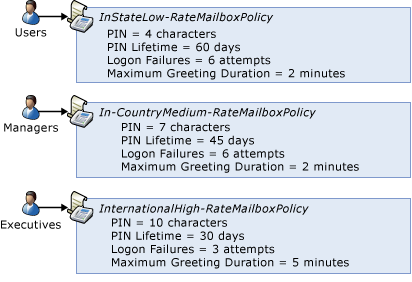Applies to: Exchange Server 2007 SP3, Exchange Server
2007 SP2, Exchange Server 2007 SP1, Exchange Server 2007
Topic Last Modified: 2006-09-19
This topic discusses Microsoft Exchange Server 2007 Unified Messaging (UM) mailbox policies and how they can be used in your Exchange 2007 Unified Messaging environment.
 UM Mailbox Policies
UM Mailbox Policies
Unified Messaging Active Directory mailbox policies are required when you enable users for Exchange 2007 Unified Messaging. They are useful for applying and standardizing Unified Messaging configuration settings for UM-enabled users. You create UM mailbox policies to apply a common set of policies or security settings to a collection of UM-enabled mailboxes. You use Unified Messaging mailbox policies to set Unified Messaging settings for UM-enabled users, such as the following:
- PIN policies
- Dialing restrictions
- Other general UM mailbox policy properties
For example, you can create a UM mailbox policy to increase the level of PIN security by reducing the maximum number of logon failures for a specific group of UM-enabled users, such as executives.
Unified Messaging mailbox policies are created in the Configuration container in the Active Directory directory service by using the Exchange Management Shell or the Exchange Management Console. By default, a single UM mailbox policy is created every time that you create a UM dial plan. The new UM mailbox policy is associated with the UM dial plan and part of the dial plan name is included in the display name of the UM mailbox policy. However, you can create additional UM mailbox policies based on the needs of your organization. Although a single UM mailbox policy is required to enable users for Unified Messaging, you can create additional UM mailbox policies and apply a common set of mailbox policy settings for other groups of users.
Each UM-enabled user's mailbox must be linked to a single UM mailbox policy. After you create a UM mailbox policy, you link one or more UM-enabled mailboxes to the UM mailbox policy. This lets you control PIN security settings such as the minimum number of digits in a PIN or the maximum number of logon attempts for the UM-enabled users who are associated with the UM mailbox policy. If you prefer, you can also control message text settings or dialing restrictions for the same or a different group of UM-enabled mailboxes.
Multiple UM-enabled users can be linked to a single UM mailbox policy. However, a single user can be associated with only one UM mailbox policy. When a user is enabled for Unified Messaging, you must specify an existing UM mailbox policy to be linked to the UM-enabled user's mailbox. After you create a new UM mailbox policy and link it to a UM dial plan, the UM mailbox policy settings that are defined are then applied to the UM-enabled users. The settings that are defined on a UM mailbox policy apply only to UM-enabled users to which the UM dial plan is linked and the UM mailbox policy is associated.
 Unified Messaging Policy
Examples
Unified Messaging Policy
Examples
Figure 1 illustrates how Unified Messaging mailbox policies can be created to control dialing restrictions and PIN security settings for three different groups.

For More Information
- For more information about dial plans, see Understanding Unified
Messaging Dial Plans.
- For more information about PIN security, see Configuring PIN Security
for UM-Enabled Users.
- For more information about how to manage Unified Messaging
mailbox policies, see Managing Unified
Messaging Mailbox Policies.

